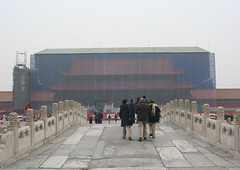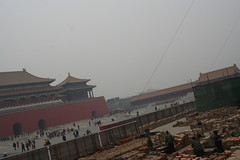In October I decided it was time to take the
GRE and apply to graduate school. I am mercifully in the decision making portion of a long test and application process that ate up much of my time during the fall semester. I thought registering for the
GRE would be easy; after all, the university students I taught in Hangzhou in 2004 were all taking the
GRE to try to get into graduate schools in the United States. It couldn't be
that difficult to register for the test in China.
But, as things sometimes are when you live in Asia, it was quite difficult. First I registered for the test in
Hong Kong because the Nanjing registration deadline had already passed. I soon found out that I could only take part of the test in
Hong Kong, the essay portion, and would have to wait until May to take the rest of the test. That was just too late. By May graduate schools would have already decided on their incoming class. So I did the next best thing I could think of: I registered for the test in Manila, where I could take the full
GRE in one four- to five-hour sitting. I could have gone to Bangkok to take it, but figured I could wrap in a long weekend with friends in the Philippines.
Why is it so much easier to take the
GRE in Manila or Bangkok than in China? Cheating. And it's not just cheating on the
GRE -- it's every test you can think of.
According to a brief in the
New York Times about SAT scores being cancelled in South Korea (apparently China isn't the only country that keeps
ETS test writers up late), in the early 90s around 10,000 TOEFL test scores were cancelled in China because of cheating.
For those of you who teach or have taught in China, this comes as no surprise. I often devised complicated methods for preventing cheating during midterm and final exams. In my writing classes I learned (the hard way) to take in-class writing samples from my students to make spotting plagiarism a little easier.
I'm not quite sure why the Philippines isn't also blacklisted by testing services. Last year the Philippines' nursing board exam was leaked.
Forty-two thousand potential nurses had taken the test, and around 17 thousand passed. Some thought candidates should retake the test; others did not think it was necessary. But perhaps the Educational Testing Service, the gatekeeper of the
GRE and SAT, among many other tests, had not had many problems in the Philippines. Or if they did, perhaps it's a question of volume: I would guess that the number of Chinese students taking
ETS tests far outnumber Filipino students.
Still -- like the DVDs that make their way to a Chinese pirating company well before it leaves theaters -- copies of standardized tests always manage to make their way to Asia, and no doubt other enterprising students around the world. Cheating students definitely keep
ETS test writers employed. In an attempt to stay ahead of the curve, they're probably writing multiple tests each month, and, not surprisingly, being beaten at their own game by the students they're supposed to test.









